Remember the English Instructions in Yantai? I saw some worse case, in Shanghai. If the Yantai is not a very big city so the mistakes of the English translation is just funny, the same thing happens in the bigger city Shanghai is sad. It is even worse if it is in the Metro Station where more than 1 million passengers every day!
I posted the exciting news of the new look of the guidance board at Xujiahui Station. It looks much brighter and the directions are clearer. See the pictures below:
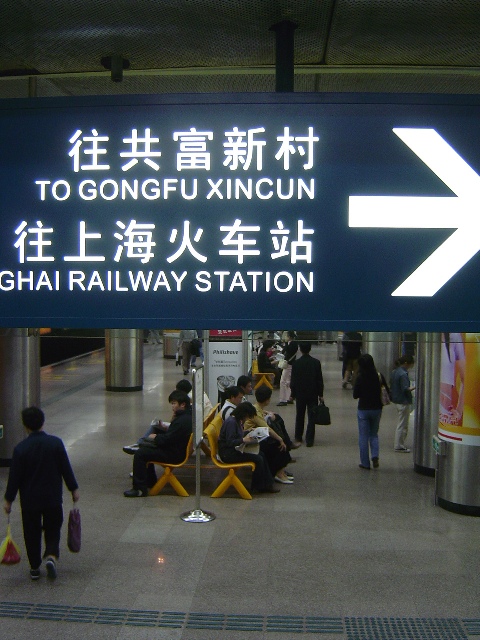
© Jian Shuo Wang
Typos
However, when I read the direction board closely, I found there are so many typos in the English spelling. I guess there are more than 50 boards in Xujiahui Station alone, but I didn’t find any board which is completely free of typos. This news is astonishing, isn’t it?
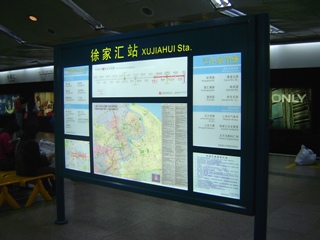
© Jian Shuo Wang
Errors
I took pictures of some of the boards, and pointed out the problems.
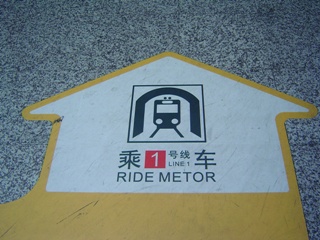
© Jian Shuo Wang
Above is the first sign of the Metro that is attached to the ground to guide people to Metro. Do they really think the direction is METOR? Also, if we take grammar into consideration, it is not right to use “Ride Metro” as a direction guide.
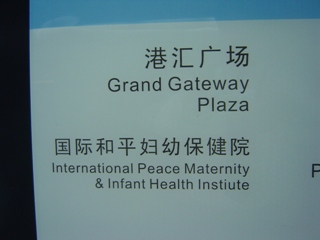
© Jian Shuo Wang
Above: Have you noticed how they spelled Institute? They used Instiute.
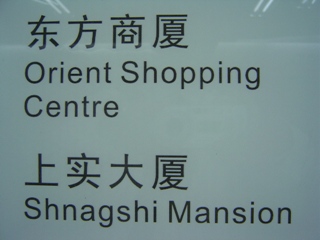
© Jian Shuo Wang
How about spell Shanghai as Shnaghai from now on, since they spelled Shangshi as Shnagshi. I saw lots of Shangshi was spelled that way. There is another board that capitalized MAN and spelled it as MANsion. Why? This is not a big problem compared to others.
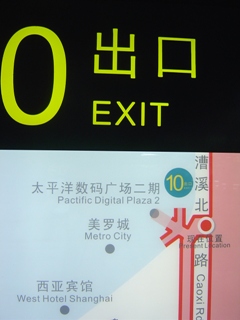
© Jian Shuo Wang
Look at the spelling of pacific. Pacticific appeared everywhere in the Metro.
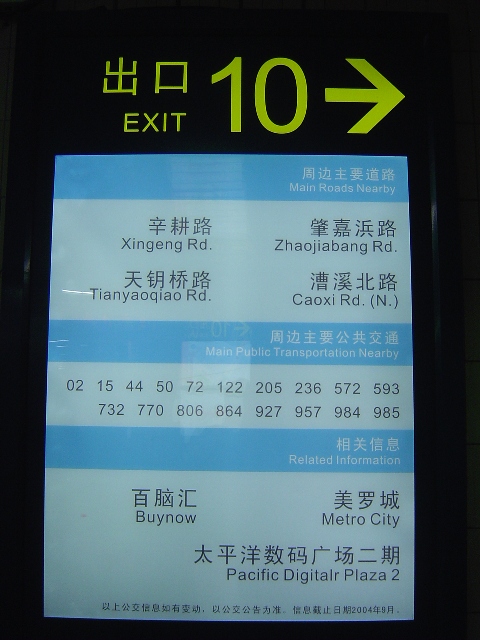
© Jian Shuo Wang
Note the Digitalr. R is not close to L on keyboard but why this R is so happy to stand with L?
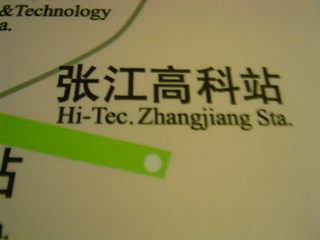
© Jian Shuo Wang. The boards on the platform.
If these signs are newly added, I found there is typo on the overhead map of all Metro train cart. Educate me if somebody has invented the abbr. Hi-tec instead of Hi-Tech.
Worried about the big project
I am very worried about the quality of the big project to replace all the signs of Metro Stations (should be more than 30 already) in the next few months. If the quality of translation remains the same, it will be one of the most embarrassing things in Shanghai’s history. I called the Metro service line, and the operator told me it is impossible to have any typo in the Metor station, because “all the design and wording have been thoroughly reviewed by experts”. She suggested me check whether my English spelling has problem because “experts’ review won’t be wrong”.
I finally convinced her there was no problem with me after I gave her the example of the spelling of Shnaghai. She seems to agree that it should not spelled that way even she does not seems to know English. She promised to ask someone to check and get back to me. BTW, if I didn’t insist to leave my phone number and my name, she may forget to collect it while promising to call me back. I checked and found they didn’t have caller ID display functions on their telephones.
I get my finger crossed to see how this can be improved. I found a good citizen inside myself this time again and will try to fix the problem on my personal effort. Does any body want to join the campaign to remove highly visible typos like this? If you want to do that, what is your suggestion besides calling them? BTW, I have called news reporter from OTV Wide Watch Program from Oriental TV already and he promised to look into it. The last time I contacted him was to report the always-red traffic light near Nandan Road.
Updated ShanghaiWiki.MetroTypos Created October 20, 2004
As Qingsi Zhu suggested, I have created a ShanghaiWiki site to allow people to collaborate and work out a better plan for Metro. Every reader can contribute to that page. Read more…
Updated Progresses October 20, 2004
I have talked with the person in charge of the Xujiahui Station and brought her to all the board and pointed the typos to her. She said “OMG!”. I guess this is a very positive move to correct these typos. The next step is to help build a corrected version of the sentences so they can use it as a reference. I will talk about this in details tomorrow.
I think it’s a very noble cause you are trying to pursue. It reminds me of an article I read a few weeks ago in the Shanghai Daily. The article mentioned the fact that the Shanghai Local Government intends to get rid of all Chinglish, Misspellings etc. They would consult Chinese experts and overseas (probably meaning Chinese who returned to China after some studies abroad) Chinese experts to make sure the English signs would be perfect. I missed one thing in the article, they didn’t mention consulting native speakers. I am Dutch and still in the process of improving my English, evenmore I dare asking people to correct me if I am wrong. And that happens a lot. If the local government would adopt such an approach or maybe even pay a well educated Englishman there might be a chance things will improve.
My god, it’s really a very big problem, and not as like as my mistaken typos on my personal site!
And I also think Jianshuo you’ll be a hero again :-)
I’d like to join such a campaign to remove conspicuous spelling mistakes from my city. I’d rather not have the english version there if all it serves is to embarrass ourselves.
it’s not so much about consulting the english speakers. then the shanghai government would probably need to set up a seperate bureau for spell checking. the better way to go is to give the business to firms specializing in sign board making instead of letting the irresponsible bureaucrats handling it. (Spelling Shanghai as Shnaghai is a clear proof that it’s not just substandard english but complete negligence . The perpetrator should be held responsible for tarnishing Shanghai’s image.)
What about setting up a wiki-style website and let us supply and choose our translations? It could begin with names for streets, buildings, and go on to brief intro about places of interest in Shanghai. It could also begin with English then expand to other languages. I’m sure many Shanghai-loving people will be more than happy to get involved. If successful, our translation may become official, or at least for officials’ reference.
It’s just like many fansub groups on the Internet making subtitles for animes and movies, and everybody agrees that fansubs have higher quality than those made by media companies.
i think i’m a bit carried away… but i can’t help, because i love shanghai. There are way too many mispellings and wrong translations in the city. Metro is only one case. For another example, bus companies in Shanghai call 新村 “Newly State” (i suppose they actually mean New Estate). I think the above idea is cool and feasible. Contact me: qzhu08@amherst.edu if anyone’s interested.
JS, that’s great that you care enough to do something about it! What bothers me the most, is that these are not very difficult words, they are common vocabulary that could be found in any Chinese-English dictionary. You don’t need an expert, you just need the right person who care enough to look it up in a dictionary!! So it seem to me the typos are not the result of lack of “expert” knowledge rather the sign of apathy.
I don’t know much about how things work in China, so I can only offer what I would do in similar situations here:
===> find out 1) who manufactures these signs
2) who is ultimately responsible for signs for public transportation system (i.e. is there a dept of transportation in SH?)
===> then write letters to them as a concerned citizen, including pictures, and the correct spellings.
===> send pictures to the press, which you have already done. Do you think they would publish it? since this could give incentive to other concerned citizens to take on your cause.
===> would it help to have so called “experts” write to these places? I only say this b/c of the employee’s response to your phone call (i.e. native speakers who work in SH, Linguistic professors in SH) I don’t know if this would backfire. It seem that sometime its difficult for people to accept criticism from foreigners, b/c of the “face loosing” aspect. I guess no matter what you do, its important to be clear that you are doing this b/c you care about SH, you care about SH’s image, and its for the betterment of SH.
I wish I can help you! b/c this is one of my pet peeves everytime I go to SH. If you think it would help, I can write to the Chinese Embassy here. Maybe to the Tourism and the Economic depts. I could attach your pictures the pictures you have if you send it to me. Let me know what you think.
In the mean time best of luck to you. It would be awesome if things started changing b/c of one concerned citizen!!
So wut?
I love Shanghai~~~ :P
JS,
On your trips to Beijing, do you find the signs there have less errors, or about the same quality? Also, at the airport, are the signs better quality than the metro stations? I don’t know if there is any deduction one can make from these comparisons.
Hey also, since China is hosting the 2008 Olympics, IOC probably would inspect the major cities many times. Do you think they would make suggestions to whoever is in charge, to make these signs correctly?
Anyways, I don’t know if any of mine suggestions are relevant given my limited knowledge, but I hope to help in anyway I can.
Qingsi, how much effort would it entail to do the wiki-style website you mentioned. (for those of us less technically inclined)
p.s. if anyone is feeling really rebellious, I suppose one can go post one’s own signs next to the mis-spelled ones. I don’t know how much trouble it would bring you with the authorities.
Mr. Wang
I was told last year that the authority has send people to rectify the typos in light of the laughing stock, isn’t it?
Stephen
Mr. Wang
Please tell me why the English commend by you and your blog readers who reside in Shanghai are much better than those people working for the big corporations.
When I was in Shanghai, I can see typos everywhere including corner stones and big billboards, you can blame the sign makers lack of English background, but the head of the corporations must prove read the final vision before it hit the street.
Typos is only one problem but the grammatical mistakes made things even worse, just look at the public proclamations posted at the tourist areas, sometime it really creates laughing stock for the foreigners.
Stephen
Public signs are not the only problem. I had my wedding pictures taken in China and spent a lot of money. However, when I went to pick it up, I noticed that ALL the pages with english words had misspellings or simply used the wrong words. Imagine how embarrassing it is to show it to your friends!!!
mmm…….发给市长看看
IT SHOULD NOT SHANGHAI AS IT IS FOR THE BUILDING SHANGSHI
This is not a lack of experts. This is a lack of necessary attention to the details.
I think the correct term for the kind of errors should be “misspelling”, not “typo”.
This aside, what you are doing is good deed. I hope Shanghai municipal government officials are reading this and do something about it.
What a shame! As a local citizen, I feel embarrassed. Hope they will do something about it!
Jianshuo, with my poor chinese reading even I can see that it is not “Shanghai” but have to be something different than that. See the chinese spelling on your first photo. I think SQI@ is right.
I have photographed many of the funny typos, and many of the signs in China.
An example, in the western world I haven’t seen the NO SPITTING sign.
In Hongkong they have an abundancy of signs, fining people for anything from smoking to spitting and begging. Emagine how a beggar should be able to pay a fine of thousands of HK$ !
And the no-smoking 5000HK$ fine signs are even placed in small private companies elevators too. Who should look out for violators ?!!
The signs are funny for tourists, but confusing for chinese, who maybe want to learn a fragment of english by reading the signs and compare the chinese with the english… Fatal !
And as people should be thinking if chinese as well educated and progressive people, the bureaucrats should be held responsible.
I remember CINDY, who was writing comments before, she is working at some newspaper in this town, maybe a good idea to get it on print. How about an article in the “Metro” newspaper, Jianshuo ? You can contact them. Free newspapers are always popular, we have the “Metro” in my western country too.
Another thing, today I asked the quite highly ranking workers in the factory I help to be in operation, that they should clean the 40 mill. RMB machine, when they had spare time, as the machine can not be cleaned by any other workers, only these people know to prevent the dirt to go into the high-tech parts.
The answer – Nono, it is no problem that it is dirty ! (Means – “we are use to that”)
And they just laughed of me…. Where are China going, if not making some progress ?
I think JH is right, people are taking an indifference attitude towards the ever changing enviroment and paying little attention to the details. In the long run, I think it is going to hurt China.
Stephen
Mr. Wang,
As matter of curios, please tell if English course is offered to the students in Shanghai, if so, how good is their ability to write and speak English by the time they finished high school.
Stephen
It is a matter of lack of attention to details, but also a matter of incompetence and irresponsibility among the bureaucrats. Shanghai’s Mayor should be shamed by these. Misspelling English words might be excuseable but messing up Pinyin, even the name of your city?
bigbro, please note that it is not a misspelling of Shanghai, you should be able to see that. It is Shangshi.
It is only the a and n that have been changed (confused :-).
Any with just a grain of influence should take this to the medias.
But “THIS IS CHINA”.
See the ranking of China and other countries in :
http://www.weforum.org/site/homepublic.nsf/Content/Global+Competitiveness+Programme%5CGlobal+Competitiveness+Report
China does not develop itself as quick as the chinese people thinks and knows….
MOSTLY due to the governing of China.
I’m sure that the people itself have the will, but are (of course) not allowed to let it free !
carsten, u should suck my dick with tomato sauce.
I’m agree with BS even if his language was quite rude…
Jianshuo it’s a very noble task you want to achieve, but i will take the problem in another way. Why translate chinese into english in a chinese city? the foreigners, “the westerners” seems to make any effort to live in a foreign country and they just judge China by their background. You as a chinese people seems to be so open minded, so please to satisfy the westerners. but why the westerners are not thinking the same way and be less proud of themselves…
and I’m not a patriotic chinese person, i’m a chinese born french but i can’t stand how the western countries judge the china and the east… they just stuck to their culture, thinking it’s the best and only way of good thinking…
(sorry for my poor english indeed)
I think it is rather necessary for translations of Chinese characters into its English equivalent. I believe it is part of being friendly, especially in an increasingly cosmpolitan city like Shanghai. Decoding Chinese characters can be quite a daunting task for people who do not have knowledge of written Chinese.
Having lived in France, I understand how speedyop feels. The French seems unwilling to adopt any other language but French. But I think in France, its a matter of principles. The French made some effort even to establish l’Academie Francais, to establish a single France as one country. Accomodating for other languages is a sign of disunity from the conceptual point of view. The idealistic aim is to unite France and not to be anti-foreign. I felt that somehow, it became a notorious and rather misunderstood characteristic of the Frenchman. And probably somewhat misinterpreted by their own citizens as well.
A point on language translation is that I see two kinds of possible translations. A direct translations to its English phonetic equivalent, the Hanyu Pinyin, or a semantic translation. Each character in Chinese carries a lot of implicit meaning and the translation in meaning to its English equivalent is not a one Chinese character to one English word mapping relationship. Ultimately, I guess it is up to the kind of message that the person who designed the message board wants to convey.
Mr. Wang,
I have an interesting question for you – which version of English is being used in China? Like center = centre, habor = habour, color = colour, jewelry = jewellery.
This is the different between American version and English version. In Japan, Taiwan,and Philippine are using American version, whereas Hong Kong, Singapore and India are using English version. The version of English being used will be adopt by all commercial, government and school of that country.
When I was in Shanghai, I can not see the clear distinction between the two versions through the commercial signage.
Please advise!
Stephen
Speedyop, you may find this article on CNN intereting. Seems like the French are making a big push to attract Chinese tourist, including having Chinese language leaflets at major tourist sites :-)
http://edition.cnn.com/2004/TRAVEL/10/21/bt.china.travelers.ap/index.html
I think the English used in China is a hodge podge of American and British English. I hope the government will move to standardise this situation (so that it doesn’t look so out of place). As a Chinese-Canadian (and being hopelessly biased living in an English-speaking country!), I think that English (at this point in history) is an international language, and that having English signs is very helpful to visitors from other countries. It doesn’t necessariily mean that Chinese are kow-towing to the Americans, it just means that people from Africa, South Asia, South America etc can have an easier time navigating their way through China as well.
Something as small as English signs are an invaluable source of information to a non-Chinese literate visitor. If the signs were translated properly, it would indicate that the Chinese do care about their foreign guests.
Stephen, as English is not an official language in China (unlike the situation in places you mentioned), there’s no requirement to use one but not the other. Both exist. It’s confusing but it’s not our fault. American spelling is more widespread because the school textbooks use it.
Shanghai is not the only offender in this kind of spelling mistakes. Check out http://www.engrish.com to see examples from other countries like Japan.
I think those typos are mainly due to the typesetting workers, no the designers. As you see them, they’re really TYPOs, aren’t they? The typesetting workers do not know English, thus are very insensitive to misspelling of English words.
So the remedy would be to have the printing mask, or whatever it is, got reviewed before it is finally printed out. An average college student can do this.
Just an engineer’s view: try to solve the problem and try not to be that cynical. :-D
>>> Why translate chinese into english in a chinese city?
Speedyop, you might be surprised to know that in the US (where I’m from) and many other western countries, in places like airports or subways, where there are lots of international travelers, you will often find signs in more than one language.
It shows that the city welcomes foreigners, and wants to help them get around. Public transportation and airports are very confusing for foreigners in any country. It’s much worse if they cannot read any signs.
Of course it’s more convenient to have many languages displaied in public transportation. I remember the MTR in Hong Kong with 3 speaked languages at each station (with the famous british “mind the gap” in cantonese, mandarin, english). And I also admit that if the city of Shanghai want to write english on their signs, it’s better to write it without mispelling…
One thing I noticed last year in Shanghai on some of the trains was the sign “Please take care of the gap”… sounds strange – it’s like you own something and want to take care of it…. like “take care of your property” or “take care of your child”… it should say something like “please be careful of the gap”… or “take care when you step over the gap”, etc… maybe I can adopt one of the gaps and take it home with me, then I can take care of it forever more… :D
The problem of Chinglish is not confined to just public signs.
Most websites by Chinese companies looking for overseas business also suffers from inadequate English – yet it seems difficult to convince the owners of these companies that their English needs fine tuning.
Why is that?